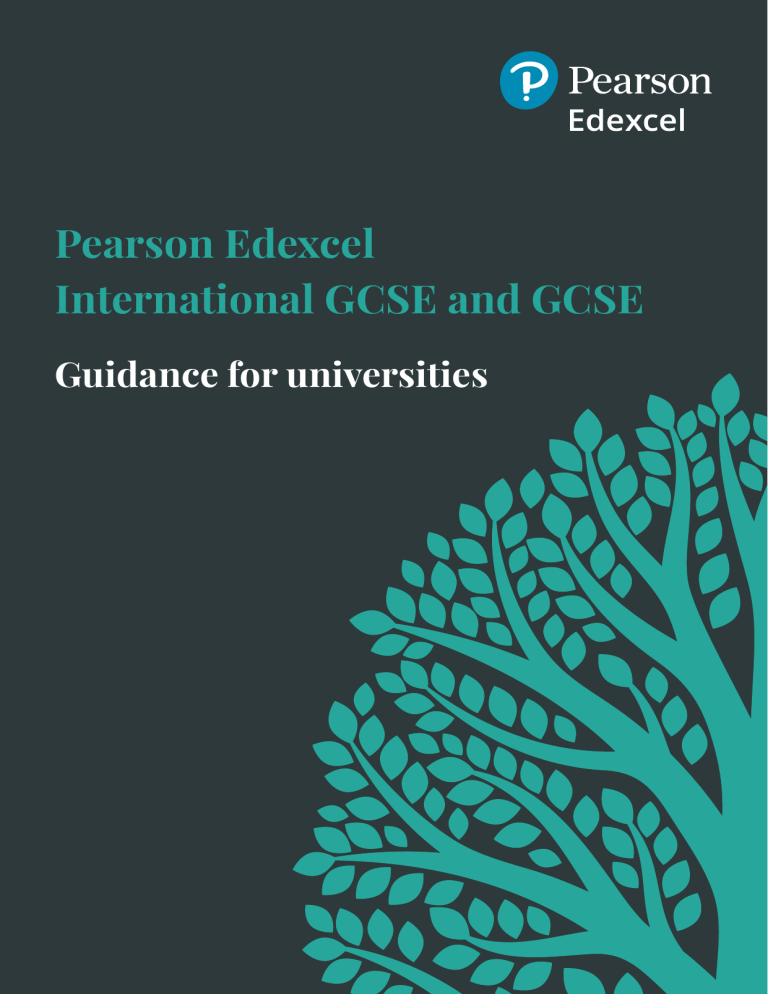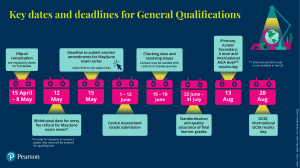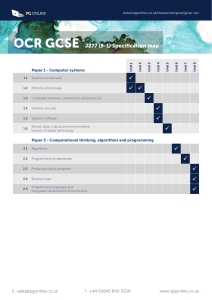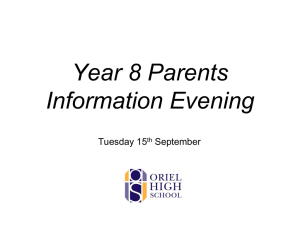
Pearson Edexcel International GCSE and GCSE Guidance for universities Welcome Pearson Edexcel International A levels (IAL), GCE A levels, International GCSE and GCSE qualifications are part of our iProgress offer, a consistent learning journey for students aged 5-19 and their educators worldwide. About GCSE and International GCSE Our GCSEs and International GCSEs are taken by students typically aged 14-16 in over 80 countries, enable seamless transition into the next stage of study. This includes International A level (IAL) and GCE A levels. Our International GCSEs are built on the UK GCSE curriculum and offer adaptation for overseas learners through the inclusion of localised and international content. Find out more: https://qualifications.pearson. com/en/qualifications/edexcel-internationalgcses.html. GCSE and International GCSE comparability Our GCSEs have been recently updated in line with changes made by the UK Government. These qualifications are now linear and all students take all assessment at the end of the programme of study. Pearson Edexcel GCSEs are now graded on a new scale (9–1), with 9 being the highest grade. To ensure international students have the same opportunities as students taking the UK GCSE option, we aligned our new suite of International GCSEs with the new grading for GCSEs (9–1) in England, and were the first awarding body to do so. Pearson Edexcel GCSE and International GCSE comparison table GCSE International GCSE Eligibility UK state schools, UK independent schools and international schools UK independent schools and international schools Curriculum Over 40 subjects 37 subjects Structure 2 year linear structure 2 year linear structure Assessment Mainly examination based2 Mainly examination based2 Grading All subjects awarded under 9–1 grading by 20203 All subjects awarded under the new 9–1 grading scale from August 2019 Regulation Regulated by Ofqual Regulated by Pearson and confirmed by UK NARIC to be comparable to UK GCSE standard In April 2019, UK NARIC1 independently assessed our new International GCSEs and confirmed they meet the UK GCSE standard. The National Agency, managed on behalf of the UK Government, under contract to the Department for Education (DfE), provide the only official source of information on international qualifications and skills attained from outside the UK. 1 Other types of assessment used only where needed to test essential skills 2 In line with Ofqual’s GCSE reform timeline: https://www.gov.uk/government/publications/gcse–changes–a–summary/summary–of–changes–to–gcses–from–2015 3 2 Understanding 9–1 grading Examinations and certification In August 2019 onwards, all Pearson Edexcel International GCSEs and the majority of our GCSEs will be awarded under the new 9–1 scale. All GCSE subjects will be awarded under the 9-1 scale from August 2020. With over 5 million GCSEs being awarded using the new 9–1 scale by 2019, 9–1 will be leading the way. These occur at various times of the year, depending on the type of qualification: The change to GCSEs only applies those awarded in England but not Northern Ireland and Wales. International GCSEs from other UK awarding bodies may still follow the existing A*–G grading scale. This means universities will still receive applications from students presenting GCSEs and International GCSEs from the new 9–1 grades and those from the existing A*–G scale. Students on both scales will need to be assessed equally. Comparing the 9–1 and A*–G grading scales There are nine numerical grades (9–1) instead of the current eight letter (A*–G) grades that you’re currently used to: The new grade 9 is a higher level of achievement that sits above the existing A* NEW GRADING STRUCTURE Grade A is equivalent to the new grade 7 There’s greater differentiation in the middle of the scale, with three new grades 6, 5 and 4 rather than two grades (B and C). The majority of universities will use the new grade 4 as the minimum pass. This is equivalent in standard to the current C grade 9 8 7 6 5 CURRENT GRADING STRUCTURE A* Important dates Qualification Examinations Provisional results Final certificates issued International GCSE January4 March4 April4 May/June August5 November May/June August5 November GCSE Students receive provisional results until final certificates are printed and sent to their centre as they may choose to ask for a review of the marking of their paper Students also can opt to improve their final GCSE and International GCSE grades by resitting all papers of the qualification (please note, some non-exam assessments can be transferred). Resits will not be indicated on the results statement. International GCSE and GCSE level results are issued on separate documents clearly labelled with the relevant qualification. A B 4 C 3 D 2 E F 1 G U U I took Pearson Edexcel International GCSEs because they are as equally valued by schools, colleges and employers as Pearson Edexcel GCSEs. Cristina Bermúdez Álvarez, Spain Small number of selected subjects only 4 Released to students exactly a week after International A level and GCE A level 4 3 Results statement examples Examination date Unique centre and candidate codes and name Provisional grade Qualification type Watermark Subjects awarded 4 Provisional grade Final certificate examples Examination date Final grade Logos showing regulated status of qualification Signature of Pearson’s Responsible Officer 5 Receiving official results We can post or email official copies of students’ provisional results to universities outside of the UK following their release to students after every examination series. Students can indicate which universities should receive their provisional results from us using an online form on https://qualifications.pearson.com/en/ support/Services/certificate-services.html. Ahead of time, universities can instruct students to contact progression@pearson.com to be notified when the online application for their qualification and examination series is available. Recognise our qualifications Where used as a qualification for admission, Pearson Edexcel International GCSEs are accepted as GCSE equivalents on a grade for grade basis in universities and colleges around the world including: l All UK universities (including Oxford and Cambridge) l Canadian universities including University of Toronto and University of British Columbia l All Group of 8 universities (Go8) in Australia lUniversities across Asia including: University of Hong Kong, University of Tokyo, Chinese University of Science and Technology and the National University of Singapore These universities confirm they equally recognise the new 9-1 scale within their admission requirements. In addition to over 50 UK universities, a number of global institutions accept one or more of our GCSE and International GCSE English qualifications as proof of students’ undergraduate English proficiency. To confirm acceptance of the new 9-1 grading or our GCSE and International GCSE English qualifications, please contact progression@pearson.com. We will add your institution to our published lists, helping you instantly become more visible to our students around the world. From 2017 entry, we will accept a mixture of GCSEs, those which have been taken under the new format and those which have not. The proposed model and assessment questions would certainly support progression to higher levels and secure these qualifications as being rigorous and challenging. University of Exeter, UK Aston University, UK Find out more, visit Progress to University Visit our website: qualifications.pearson.com/progress-to-uni or email: progression@pearson.com








